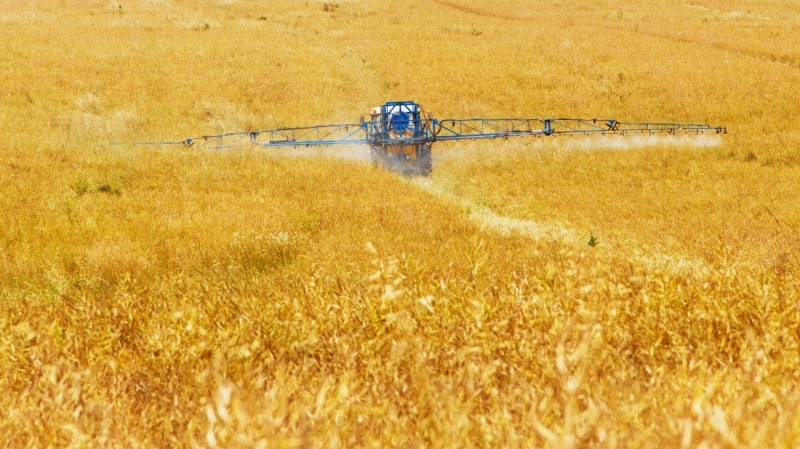Last week the European Commission announced that they will withdraw their proposal for a new law to reduce pesticide use. However, doing nothing to address the pesticide problem is not an option. Soils are depleted, water is polluted and biodiversity is in crisis. With the current application of regulations we are not protected against the harmful effect on our health. Farmers, their families and neighbours are the first victims. François Corbieau, investigative journalist for the Belgian RTBF, illustrates in his recent investigative work the dramatic health effects of pesticide use on Belgian and French farmers.
Though it remains a controversial subject, François Corbieau was able to compile invaluable testimonies. Belgium is the third nation in Europe on the pesticide spraying podium. Martin Dermine of the Pesticide Action Network (PAN) is familiar with the reassuring rhetoric of the pesticide industry and the large farming unions, and denounces it. "Farmers tell themselves that if they use pesticides at the authorised doses, there are no risks. And so this belief instilled by the pesticide lobbies in the farming community has percolated very well. As a result, farmers think less about protecting themselves, because they're led to believe that if they use pesticides properly, they'll be fine.”
Pesticides: a taboo topic
Pesticides' consequences on farmers' health are still taboo in the community. Farmers are afraid to speak up about what they witness in their local communities. This even if NGOs’ report underlines 80% of those pesticides authorised in Belgium are still considered dangerous. 6000 to 7000 tonnes are sprayed in the country every year.
Diagnosed by doctors with heavy metal intoxication related to his work in 2015, Belgian farmer Francois Hubert shares his experience. Lack of awareness on health consequences, leukaemia, farmer's early death - his testimony is opening farmers’ Pandora boxes.
"It's hard not to think about pesticides when you see a farmer who is still in the prime of life taken away in a matter of months by lightning leukaemia", says François Hubert.
Similar story in France. Jean-Luc used to harvest maize and cereal crops in Bordeaux. He was only 40 when doctors diagnosed him with a myeloma, bone-marrow cancer. In a snatch, his life shifted from working on the field to a 100% work incapacity. Jean-Luc clearly remembers the headaches after spraying and the heavy fumes brought by the wind he used to breathe.
From France to Belgium, both doctors made a strong link between the farmers' health issues and pesticide use during work. Recently the French media Vakita also highlighted the struggles farmers go through to have their disease officially recognized as a work disease.
Parkinson’s, blood and prostate cancer
Not only Francois Hubert and Jean Luc share their struggles, but scientific research with epidemiological studies documents pesticide risks. From the French INSERM research centre, Isabelle Baldi led the team who analysed 5000 studies since 2013. Their work focuses on evaluating links between pesticides use and health issues.
"Today, it's becoming more and more difficult to doubt the effects of pesticides on health, even if we still sometimes hear speeches that try to instil a little doubt.” says Isabelle Baldi, lecturer at the University of Bordeaux. She is head of the EPICENE team for "epidemiology of cancer and environmental exposure" at the French National Institute for Health and Medical Research (INSERM).
For the past 13 years, this epidemiologist has led a multidisciplinary group of a dozen experts tasked with examining the links between pesticide use and the onset of certain diseases. The research team concluded that: “There is a high probability rate between pesticides and neurodegenerative diseases like Parkinson's disease (...) We also established a strong link between certain blood cancers, malign non-hodgkin's lymphoma, and prostate cancer." Their 2021 report confirmed their 2013 findings.
In the fields, other INSERM researcher François Bailly helps following 180 000 farmers all over France since 2005. His team measures pesticides exposure on fields and the results are worrisome. In the investigation, he shares that the efficiency of protective equipment is overestimated. Even wearing them, farmers are exposed to pesticides. “Clearly, according to these field studies, even a farmer who plays the game completely, protects himself, wears a mask, gloves and overalls, still runs the risk of being exposed to pesticides. Admittedly, this exposure will be lower; we're not saying there's a total absence of effect from protective equipment," insists the researcher in the article. “But the protective effect of such equipment is greatly overestimated, particularly in regulations."
Full story (in French): #Investigation – Pesticides : les agriculteurs wallons exposés malgré les équipements de protection (RTBF, 17 January 2024)
The illusion of security
In an earlier article and a webinar we highlighted the difficulties for Farmers to wear protective equipment. From heavy temperatures, costs, fields reality with the need to move around tanks and machines, protective equipment is very far from being the miracle solution to pesticide contamination. Sometimes the protection makes the effects even worse.
Negative effect of pesticide exposure for farmers and farm workers
From tank preparation to pesticide mixing and spraying, farmers’ work can expose them to high volumes of chemicals. This working environment threatens their health. Pesticides can lead to cancer or neurological diseases like Parkinson’s. One of the solutions promoted to reduce exposure is personal protective equipment, but its efficiency is now subject to heated debate in the scientific community. In some cases, the equipment might make things worse
Read more in the article here.
Fabienne Goutille explains the negative effect of pesticide exposure for farmers and farm workers in this video.
